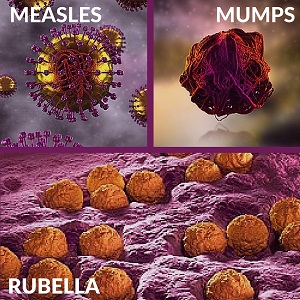Measles, Mumps, Rubella (MMR)

Measles, Mumps, Rubella (MMR)
Adolescent Vaccination Recommendation: Adolescents who were not previously vaccinated should get two doses (with at least 28 days between doses); those who only received one dose previously should get the second dose.
About measles, mumps, rubella:
Measles is a highly infectious respiratory disease that can result in severe, sometimes permanent, complications including pneumonia, seizures (jerking and staring), brain damage, and death. It it highly contagious and spreads easily by contact with an infected person through coughing and sneezing. In fact, if a person has measles, 9 out of 10 of his close contacts will get it too, unless they are protected. Symptoms include rash, cough, runny nose, eye irritation, and fever.
Why should you your child be vaccinated against measles? Measles cases in the US are at a 15-year high, due largely to international travel. According to the Centers for Disease Control and Prevention (CDC), as of November 2018, 220 individual cases of measles were confirmed in 26 states and the District of Columbia and a total of 15 outbreaks (defined as 3 or more linked cases) have been reported in 2018.
Mumps is caused by the mumps virus, which lives and reproduces in the upper respiratory tract. It is spread through mucus or saliva when an infected person coughs or sneezes. Mumps can lead to serious complications such as deafness, meningitis (infection of the brain and spinal cord covering), painful swelling of the testicles or ovaries, and, rarely, death. Symptoms include fever, headache, muscle aches, tiredness, and loss of appetite, followed by swelling of the salivary glands. The parotid salivary glands (which are located within the cheek, near the jaw line, below the ears) are most frequently affected, giving the cheeks a puffy appearance.
Rubella, also known as German measles, is a viral disease spread by contact with an infected person through coughing and sneezing. While rubella is typically mild in children, adults tend to have more complications. The main concern with rubella is infection in pregnant women; if contracted in early pregnancy, it can lead to miscarriage or birth defects, which is another reason why it is important for any female of child-bearing age to be vaccinated. Older children with rubella usually first suffer from low-grade fever, swollen glands in the neck or behind the ears, and upper respiratory infection, before they develop a rash.
